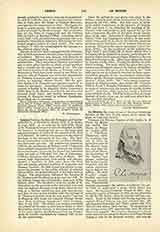

Leipzig, UNIVERSITY of.—The University of Leipzig in Saxony is, next to Heidelberg, the oldest university in the German Empire. It was established when the German students under the leadership of Johannes of Munsterberg, who had been deposed as rector by King Wenceslaus, left Prague in May, 1409, and went to Leipzig. The cause of this withdrawal was the national disorders provoked in Bohemia by John Hus. At Leipzig Friedrich and Wilhelm, Landgraves of Thuringia and Margraves of Meissen, founded a studium generate, the Bull for the foundation being issued by Pope Alexander V at Pisa, September 9, 1409. The charter was signed on December 2 of the same year, and the first rector was Johannes of Munsterberg. In the first semester 369 students matriculated. The Bishop of Merseburg was appointed chancellor. At the opening of the sixteenth century Leipzig was, like Cologne, a stronghold of scholasticism, and a large part of the “Epistolae virorum obscurorum”, written in Erfurt near by, refers to it. The university, especially the theological faculty, remained true to the Church at the beginning of the Reformation, while Wittenberg, founded in 1502, was a starting-point for Luther’s doctrine. During the period of religious dissension the University of Leipzig declined greatly. Through the efforts of its rector, Kaspar Borner, the university obtained from Duke Maurice of Saxony an annual grant of 2000 gold gulden. In 1543 it was housed in the Paulinum, a secularized Dominican monastery. In 1559 the amendment of the statutes by the rector, Joachim Camerarius, was completed. In the seventeenth and eighteenth centuries the university suffered considerably from wars, epidemics, and the billeting of soldiers. It remained, however, especially in the eighteenth century, a center of scholarly and literary activity, well-known representatives of which were Johann Christian Gottsched and Christian Furchtegott Gellert.
In 1768 Prince Joseph Alexander Jablonowsky founded a learned society for history, mathematics, physics, and economics, which is still in existence. The Linnaean Society for the Advancement of the Natural Sciences was founded in 1789, and in 1824 was united with the Society for Physical Research. In 1812 the university dropped its Protestant ecclesiastical character; and in 1830 received a new constitution. A decree of King Anthony of Saxony abolished the old division of professors and students into “nations” and entrusted the administration of the university to the rector and the four faculties. By a ministerial decree of 1851, the body of the ordinary professors form the university assembly; they elect the rector and a member of the Lower House of the Saxon Diet, and have the bestowal of the benefices belonging to the university. Besides this assembly there is a smaller body, the senate, composed of the rector, the pro-rector, the four deans, and twelve representatives elected by the faculties. In 1836 a new university building named the Augusteum, in honor of Frederick Augustus, first King of Saxony, was opened; in 1871 an auditorium called the Bornerianum, in honor of the rector Kaspar Borner, was added to the Augusteum. In the summer of 1897 there was opened a new building, erected from the plans of Arved Rossbach, on the site of the original university. From old and new donations the university has a large endowment in land and funds, over which the Saxon Government has the right of supervision and administration. In 1909 its property amounted to thirty-one million marks. The basis of the university library consists of the valuable collections taken from the suppressed Saxon monasteries; it contains about 600,000 volumes and 6500 manuscripts. At the instance of the rector of that period, Dukes Maurice and Augustus of Saxony founded, April 22, 1544, a refectory (mensa communis) for needy students, where meals could be obtained either without cost, or at moderate prices. At the present day from two to three hundred students share in this privilege.
Among the distinguished scholars may be mentioned: in the evangelical theological faculty, Tischendorf, Luthardt, and the ecclesiastical historian, Hauck; in the faculty of law, von Wachter, and Windscheid; the Germanic scholar Wilhelm Albrecht, and his pupil von Gerber, later Minister of Worship and Education in Saxony; the historians of German jurisprudence, Stobbe and Sohm, and the authorities on criminal law, Binding and Wach. More than one-fifth of all the law students of Germany in the years 1875-85 took a part of their course at Leipzig. At the present date the law faculty of Leipzig ranks third in Germany, after Berlin and Munich. In the medical faculty, Benno Schmidt, Trendelenburg, and Kolliker have especially aided in the advancement of surgery; in anatomy, Bock and His; in pathological anatomy, Birch-Hirschfeld and Marchand; in physics and physiology, Ludwig; in the philosophical faculty, Weber, the founder of psycho-physics; Volkelt, writer on aesthetics; the philosopher Gustav Theodore Fechner, and Wilhelm Wundt, the founder of the widely known institute for experimental psychology. Pedagogics developed at Leipzig into an independent science, and, when a pedagogical seminary was founded by Ziller in 1861, the study acquired a still greater importance. In the department of classical philology should be mentioned the names of Hermann, Ritschl, Ribbeck, and the archaeologist Overbeck; in Germanic philology, Haupt and Zarncke; in comparative philology, Brugmann; in the languages of Eastern Asia, Conradi; in the science of history, Mommsen and Lamprecht, who of late years has been known far beyond the circle of specialists in his department. In political economy, Roscher was the founder of the historical school; also Bucher, who is well known for his investigations into the relations of the State to trade and manufacture, and applied statistics. The matriculated students at Leipzig number nearly 5000.
KARL HOEBER

